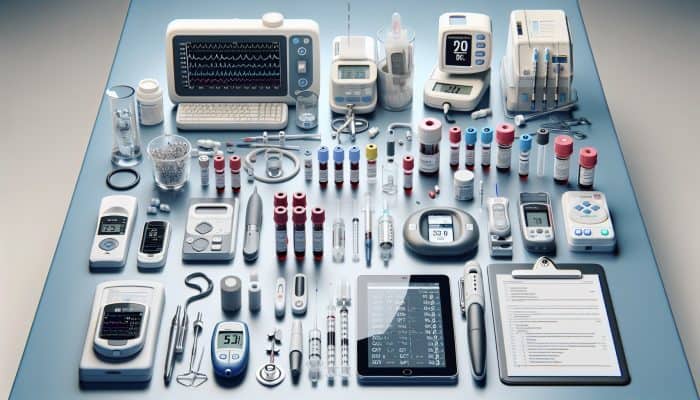Unlock the Full Potential of Diabetes Blood Testing: Your Complete Guide
Understanding the Details of a Diabetes Blood Test

Diabetes Blood Test in Abingdon-on-Thames: A diabetes blood test serves as a critical medical evaluation designed specifically for assessing your blood glucose levels. This assessment is vital for both diagnosing diabetes and managing it effectively over time. Regularly undergoing this test is key to maintaining your health, as it helps detect any irregularities in your glucose levels that could indicate diabetes or prediabetes. There are various types of blood tests available, each tailored to meet unique individual requirements. Among the most commonly performed diabetes blood tests are:
- Fasting Blood Glucose Test
- Oral Glucose Tolerance Test (OGTT)
- Haemoglobin A1c Test
- Random Blood Glucose Test
- Continuous Glucose Monitoring
- Fructosamine Test
By gaining a deeper understanding of these tests, you empower yourself to take charge of your health journey and make educated decisions for managing your diabetes effectively.
The Importance of Regular Testing in Diabetes Management
Regular testing is fundamental for successful diabetes management, enabling individuals to keep a close watch on their blood sugar levels over time. This continuous monitoring is crucial for making necessary adjustments to medications, dietary practices, and lifestyle choices to uphold optimal health. The advantages of adhering to a routine testing schedule include:
- Early detection of diabetes
- Prevention of complications such as neuropathy and retinopathy
- Enhanced control over blood sugar levels
- Informed decision-making regarding diet and physical activity
- Improved communication with healthcare professionals
By committing to a regular regimen of blood tests, individuals can proactively manage their health and overall well-being, significantly lowering the risk of serious health complications that can arise from uncontrolled diabetes.
Determining the Ideal Frequency for Diabetes Blood Tests
The frequency with which you should schedule diabetes blood tests can differ considerably based on various factors, such as your diagnosis status, specific risk factors, and the recommendations provided by your healthcare professional. Those diagnosed with diabetes may need to test anywhere from several times a day to every few months, while individuals at risk for diabetes might only need to test annually. Regular medical evaluations are essential for tracking changes in your health and making necessary modifications to your diabetes management strategy.
Locating Reliable Diabetes Blood Testing Services in Abingdon-on-Thames

Discovering Local Clinics and Hospitals for Comprehensive Diabetes Testing
In Abingdon-on-Thames, numerous healthcare facilities are dedicated to providing diabetes blood testing services. One notable option is Abingdon Hospital, which offers extensive care and various testing services specifically for diabetes management. Additionally, many local GP clinics are well-equipped to conduct blood tests and manage diabetes effectively. The availability of these resources ensures that residents can access essential diagnostic services conveniently, without the need for lengthy travel.
Exploring Private Clinics for Tailored Diabetes Testing Services
For individuals seeking faster or more personalised testing options, several private clinics in Abingdon-on-Thames offer convenient diabetes blood testing services. These private facilities often provide quicker result turnaround times compared to public services and may offer greater flexibility in scheduling appointments. Some prominent private clinics you might consider include:
- The Abingdon Clinic
- Oxford Private Hospitals
- Healthcheck Clinic
- Viva Health
Choosing a private service can significantly enhance your overall experience, particularly if you have specific concerns or require prompt results.
Leveraging Mobile Testing Units for Greater Accessibility

Mobile testing units present an innovative and effective solution for diabetes blood testing, particularly beneficial for individuals who find it challenging to travel to a clinic. These units regularly operate in Abingdon-on-Thames, delivering essential testing services right in your local vicinity. This service is especially advantageous for elderly patients or those with mobility challenges, ensuring everyone has the opportunity to actively and efficiently monitor their health status.
Pharmacies Offering Convenient Diabetes Testing Services
Many pharmacies in Abingdon-on-Thames provide accessible options for diabetes blood testing. Pharmacies such as Boots and Superdrug often offer blood glucose testing services without the need for an appointment. This convenience allows individuals to quickly and effectively check their blood glucose levels while managing their daily responsibilities, making it an ideal option for those with busy lifestyles.
Insights from Experts on Diabetes Blood Testing in Abingdon-on-Thames
Expert Recommendations for Testing Frequency
Experts suggest that the frequency of testing should be tailored to individual health conditions. For instance, patients with unstable blood sugar levels may benefit from more frequent monitoring compared to those whose diabetes is well-controlled. Real-world case studies reveal that customised testing schedules can lead to significant improvements in patient outcomes, effectively minimising the risks of complications associated with diabetes.
The Positive Impact of Regular Blood Testing on Your Life
Incorporating regular blood testing into your routine can substantially enhance your quality of life by enabling more effective diabetes management. By consistently monitoring your glucose levels, you can make informed choices about your diet and physical activity, ultimately reducing the risk of complications. Simple strategies, such as scheduling tests consistently each month or setting reminders, can streamline the process and alleviate any stress associated with testing.
Recent Innovations in Diabetes Testing Technology
The latest advancements in diabetes testing have introduced more precise and less invasive methods, including continuous glucose monitors (CGMs) and flash glucose monitoring systems. These innovations facilitate real-time tracking of glucose levels with minimal discomfort, providing patients with immediate feedback and greatly improving their ability to manage their condition effectively.
Key Preparations for Your Upcoming Diabetes Blood Test
Essential Steps to Take Before Your Blood Test
Prior to undergoing a diabetes blood test, it is imperative to adhere to any pre-test guidelines provided by your healthcare provider. Certain tests, such as the fasting blood glucose test, typically require you to refrain from eating for at least 8 hours beforehand. Following these instructions is crucial for ensuring the accuracy of your results, highlighting the importance of confirming details with your doctor in advance to prevent any inconsistencies.
What to Expect During the Blood Testing Process
During your diabetes blood test, you can expect a straightforward process consisting of a simple blood draw, usually taken from your arm. The procedure is quick and relatively painless, often requiring less than five minutes to complete. A healthcare professional will sterilise the area, insert a needle to collect blood, and may apply a small bandage afterward. Most individuals find the experience to be far less intimidating than they initially anticipated, making it a manageable component of their health routine.
What Occurs After Completing Your Blood Test?
After you have completed your diabetes blood test, you will typically be asked to wait briefly for results, especially if immediate analysis is possible. Your healthcare provider will later interpret the results and discuss their significance with you during a follow-up appointment. This discussion is essential for understanding your glucose levels and determining any necessary adjustments to your diabetes management plan to achieve optimal health outcomes.
Effectively Interpreting Your Diabetes Test Results
What Constitutes a Normal Range for Test Results?
Normal blood glucose levels can vary, but generally, a fasting level below 6 mmol/L is considered normal. Understanding these ranges is vital for accurately interpreting your results, as they indicate whether your glucose levels are within a healthy spectrum. Being informed about what defines normal levels empowers you to proactively manage your health and make educated decisions regarding your diabetes management.
The Implications of Elevated Test Results for Your Health
Elevated blood glucose levels, generally above 7 mmol/L when fasting, may indicate the presence of diabetes or prediabetes. If your results fall outside the normal range, it is crucial to consult your healthcare provider for an accurate diagnosis and tailored treatment plan. Early intervention is essential, as it can lead to improved management and reduce the risk of long-term complications associated with unmanaged diabetes.
The Process of Analyzing and Interpreting Your Test Results
Your healthcare provider will interpret your test results by considering several factors, including your medical history, current symptoms, and risk factors. This comprehensive analysis ensures that your results are accurately contextualised, guiding any necessary adjustments in your treatment or management plan. Engaging in an open dialogue with your doctor regarding these interpretations is vital for effective diabetes management and achieving optimal health outcomes.
Proven Strategies for Managing Diabetes Following Testing
Crucial Lifestyle Changes for Effective Diabetes Management
Successful diabetes management often requires significant lifestyle modifications, particularly concerning diet and exercise. Embracing a balanced diet rich in whole foods and low in refined sugars can help effectively regulate blood sugar levels. Incorporating regular physical activity, such as walking, cycling, or engaging in other forms of exercise, can enhance insulin sensitivity and aid in maintaining a healthy weight, which is essential for comprehensive diabetes management and overall well-being.
The Role of Medications in Your Diabetes Management Strategy
For many individuals living with diabetes, medication is a key component in controlling blood sugar levels. Depending on your specific condition, your healthcare provider may prescribe insulin or oral medications such as metformin. These medications can effectively assist in managing glucose levels, leading to better overall control of your diabetes. Regular consultations with your healthcare provider ensure that your medication regimen remains appropriate and effective based on your unique needs and circumstances.
Long-Term Strategies for Sustaining Your Diabetes Management
Long-term diabetes management involves regular check-ups, continuous monitoring of blood sugar levels, and adapting lifestyle choices to maintain healthy glucose levels. Establishing a consistent routine can support regular monitoring and facilitate timely adjustments to your management plan, ultimately aiding in the prevention of diabetes-related complications. This proactive approach is essential for ensuring long-term health and well-being, allowing individuals to lead fulfilling lives while effectively managing their condition.
Research-Supported Benefits of Diabetes Blood Testing in Abingdon-on-Thames
How Early Diagnosis Enhances Health Outcomes
Early detection of diabetes plays a significant role in preventing serious complications, such as heart disease and kidney damage. For example, patients diagnosed early may have the opportunity to implement lifestyle changes that substantially lower their risk factors. Real-world examples illustrate that proactive management, initiated through early detection, can result in improved health outcomes and enhanced quality of life, empowering individuals to take control of their health journey.
The Advantages of Local Testing Services for Patients
Local testing services in Abingdon-on-Thames provide numerous advantages, including convenience and quicker access to essential healthcare services. By utilising nearby facilities, individuals can effortlessly integrate testing into their routine without the stress of long-distance travel. Accessing these local resources enables residents to effectively monitor their health and promptly address any emerging concerns, ultimately enhancing their overall well-being.
The Evolution of Diabetes Testing Techniques Over Time
The methods for testing diabetes have evolved remarkably, becoming more accurate and less invasive over the years. Innovations such as finger-prick blood tests and continuous glucose monitors have transformed patient experiences, allowing for more comfortable testing without sacrificing accuracy. These advancements have simplified the management of diabetes, making it more accessible for individuals living with the condition, thereby improving their quality of life.
The Role of Regular Testing in Your Overall Health
Regular diabetes blood tests are critical for monitoring your health over time, allowing for timely adjustments to treatment strategies. Consistent testing helps track fluctuations in blood sugar levels, providing invaluable insights that can shape dietary and lifestyle choices. Highlighting the significance of ongoing testing not only aids in immediate management but also fosters sustainable long-term health and wellness, ensuring individuals remain proactive in their diabetes care.
Addressing Common Concerns and Answering Frequently Asked Questions
Is the Blood Test Procedure Painful or Uncomfortable?
The blood test usually involves a brief needle prick, which may cause minimal discomfort but is generally not painful. Most patients discover that the anticipation surrounding the procedure is more daunting than the actual experience, which typically lasts only a few seconds, making it a manageable part of diabetes management.
Can You Eat Before Undergoing the Blood Test?
Fasting is often required before a diabetes blood test; however, this requirement can vary based on the specific type of test being conducted. Always confirm with your healthcare provider whether fasting is necessary for your particular test to ensure accurate results and appropriate health management.
What Is the Typical Wait Time for Receiving Test Results?
The time it takes to receive results can range from a few hours to several days, depending on the testing facility and the specific type of test performed. Your healthcare provider will inform you when to expect your results and will schedule a follow-up appointment to discuss them thoroughly, ensuring you fully understand your health status.
What Steps Should You Take If Your Results Indicate Elevated Levels?
If your results reveal elevated blood sugar levels, it is vital to consult your healthcare provider promptly. They will assist in interpreting the results in the context of your overall health and may recommend lifestyle changes or medications to help you manage your blood sugar levels effectively, ensuring the best possible health outcomes.
Is It Possible to Reverse the Effects of Diabetes?
While diabetes cannot be completely reversed, it can be effectively managed through lifestyle modifications, proper weight management, and appropriate medication. Some individuals with Type 2 diabetes may achieve remission, allowing them to maintain normal glucose levels without the need for medication, which underscores the importance of effective management strategies.
What Symptoms Should You Watch for That Indicate High Blood Sugar Levels?
Common symptoms associated with high blood sugar levels include increased thirst, frequent urination, fatigue, blurred vision, and headaches. If you experience any of these symptoms, it is crucial to check your blood sugar levels and consult your healthcare provider for further evaluation and tailored guidance regarding your health needs.
How Does Stress Affect Blood Sugar Levels?
Stress can significantly impact blood sugar levels, causing them to rise due to the release of hormones such as cortisol. Effectively managing stress through techniques like mindfulness, physical activity, and adequate sleep can help maintain stable glucose levels, which is essential for overall health and well-being, particularly for individuals managing diabetes.
What Is the Optimal Time to Test Blood Sugar Levels?
The best time to test blood sugar levels can vary based on individual circumstances. Common testing times include first thing in the morning, before meals, or two hours after eating to evaluate the impact of food on blood glucose levels, thereby providing valuable information for effective diabetes management.
How Can You Access Support for Managing Your Diabetes?
Accessing support for managing diabetes can be achieved through local health services, support groups, or online communities. Connecting with others who share similar experiences can provide valuable resources, emotional support, and shared insights throughout your diabetes management journey, fostering a sense of community and encouragement.
Does Insurance Typically Cover Diabetes Blood Testing?
Most health insurance plans in the UK generally cover diabetes blood testing; however, it is important to verify with your provider regarding specific coverage details. Discussing your needs with your healthcare provider can assist you in effectively navigating potential costs and ensuring you receive the necessary care.
Connect with us on Facebook!
This Article Was First Published On https://bloodtest.co.uk
The Article Diabetes Blood Test Guide for Abingdon-on-Thames Residents Was Found On https://limitsofstrategy.com
References:
Diabetes Blood Test Essentials for Abingdon-on-Thames Residents



